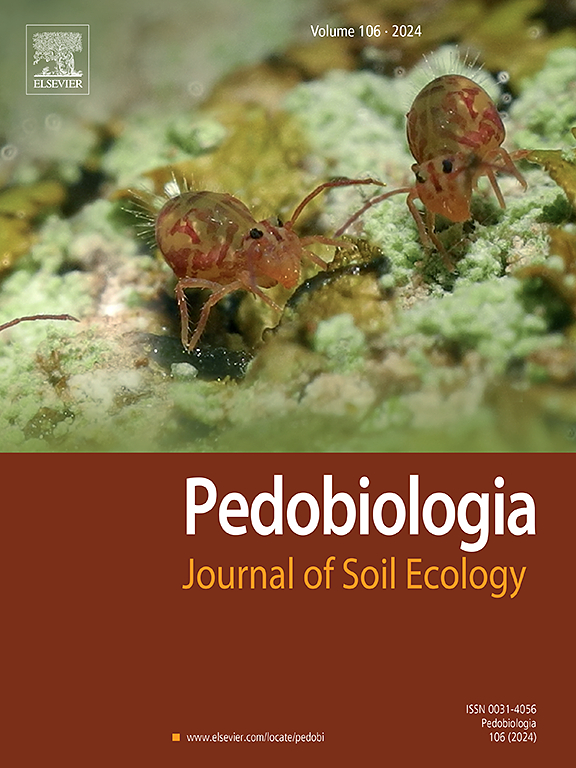Plant growth-promoting rhizobacteria-mediated remediation of glyphosate-contaminated tea plantation soils through restoration of nutrient cycling and microbial diversity
IF 2.2
3区 农林科学
Q3 ECOLOGY
引用次数: 0
Abstract
Glyphosate is a broad-spectrum herbicide widely used in tea plantations worldwide, however, its excessive use has exerted significant negative impacts on soil ecology and tea plant growth. Therefore, effective ecological remediation strategies are urgently required. In this study, a three-year field experiment was conducted in a glyphosate-treated tea plantation soil, where a plant growth-promoting rhizobacteria (PGPR) compound inoculant was applied following herbicide treatment. Metagenomic analysis was further performed to evaluate the remediation efficacy of PGPR. The results demonstrated that PGPR application significantly increased soil pH and nutrient levels (e.g., organic carbon, available nitrogen, phosphorus, and potassium) and enhanced soil enzyme activities, including protease, urease, acid phosphatase. PGPR inoculation also restored microbial diversity, optimized community structure, and upregulated functional genes associated with carbon, nitrogen, and phosphorus cycling. Moreover, tea leaf quality was improved, as evidenced by an increase in amino acid content and a reduction in phenol-ammonia ratio. Overall, the introduction of PGPR effectively mitigated the adverse impacts of glyphosate, thereby improving soil health and tea quality. These findings indicate that PGPR represents an environmentally friendly bioremediation strategy capable of restoring glyphosate-contaminated tea plantation soils and its ecosystem functions, thereby underscoring its practical value and ecological significance for sustainable tea plantation management.
促进植物生长的根瘤菌介导的草甘膦污染茶园土壤养分循环和微生物多样性修复
草甘膦是一种广泛应用于全球茶园的广谱除草剂,但草甘膦的过量使用对土壤生态和茶树生长产生了显著的负面影响。因此,迫切需要有效的生态修复策略。本研究在草甘膦处理的茶园土壤中进行了为期3年的田间试验,在除草剂处理后施用促进植物生长的根瘤菌(PGPR)复合接种剂。进一步进行宏基因组分析,评价PGPR的修复效果。结果表明,施用PGPR显著提高了土壤pH值和养分水平(如有机碳、速效氮、磷和钾),提高了土壤酶活性,包括蛋白酶、脲酶、酸性磷酸酶。接种PGPR还恢复了微生物多样性,优化了群落结构,上调了与碳、氮、磷循环相关的功能基因。此外,氨基酸含量增加,酚氨比降低,茶叶品质得到改善。总体而言,PGPR的引入有效减轻了草甘膦的不利影响,从而改善了土壤健康和茶叶品质。这些结果表明,PGPR是一种环境友好型的生物修复策略,能够恢复草甘膦污染的茶园土壤及其生态系统功能,从而强调了其在可持续茶园管理中的实用价值和生态意义。
本文章由计算机程序翻译,如有差异,请以英文原文为准。
求助全文
约1分钟内获得全文
求助全文
来源期刊

Pedobiologia
环境科学-生态学
CiteScore
4.20
自引率
8.70%
发文量
38
审稿时长
64 days
期刊介绍:
Pedobiologia publishes peer reviewed articles describing original work in the field of soil ecology, which includes the study of soil organisms and their interactions with factors in their biotic and abiotic environments.
Analysis of biological structures, interactions, functions, and processes in soil is fundamental for understanding the dynamical nature of terrestrial ecosystems, a prerequisite for appropriate soil management. The scope of this journal consists of fundamental and applied aspects of soil ecology; key focal points include interactions among organisms in soil, organismal controls on soil processes, causes and consequences of soil biodiversity, and aboveground-belowground interactions.
We publish:
original research that tests clearly defined hypotheses addressing topics of current interest in soil ecology (including studies demonstrating nonsignificant effects);
descriptions of novel methodological approaches, or evaluations of current approaches, that address a clear need in soil ecology research;
innovative syntheses of the soil ecology literature, including metaanalyses, topical in depth reviews and short opinion/perspective pieces, and descriptions of original conceptual frameworks; and
short notes reporting novel observations of ecological significance.
 求助内容:
求助内容: 应助结果提醒方式:
应助结果提醒方式:


